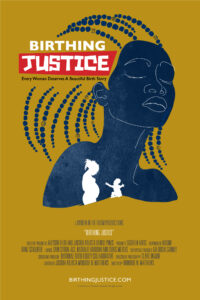Birthing Justice: Raising the Standards for Maternal Health
Pregnancy – and giving birth – should be among the most meaningful and joyful occasions a person experiences. It is a time in which birthing people and those closest to them – their families, their spouses, their health care providers – should be able to enjoy a wondrous journey that brings together a range of supports for the pregnant person and all that they’re embarking upon. And it should amount to a beautiful adventure in welcoming a new life to the world.
But instead, giving birth can be highly dangerous for people of color, particularly Black women and their babies. That’s because, tragically, it has been documented that if you are Black, you are 3-4 times more likely to die from pregnancy-related causes than if you are white, and Black infants are more than two times as likely to die in their first year than white infants. This injustice is due to racial disparities stemming from a broken maternal health care system that could, and should, do so much more to support birthing people of color.
 Birthing Justice is a new documentary by Denise Pines that looks carefully at these statistics and the racial disparities that exist in our healthcare system today. It uplifts the stories of Black people who give birth and the trauma that many of them so unjustly end up facing. Birthing Justice addresses the racial disparities in maternal healthcare through compassionate storytelling and by uplifting the values of justice and health for everyone.
Birthing Justice is a new documentary by Denise Pines that looks carefully at these statistics and the racial disparities that exist in our healthcare system today. It uplifts the stories of Black people who give birth and the trauma that many of them so unjustly end up facing. Birthing Justice addresses the racial disparities in maternal healthcare through compassionate storytelling and by uplifting the values of justice and health for everyone.
The Opportunity Agenda (TOA) is proud to support this film, and to partner with the film makers of Birthing Justice to bring to the fore the challenges that many Black people who experience childbirth face. The film identifies and advocates for solutions, such as expanded Medicaid and related legislation, that can reduce these inequities.
Following our vision to create opportunity for all, TOA is pleased to support Birthing Justice and all that it is attempting to achieve.
We also want to acknowledge that the film presents sensitive content and subject matter, particularly for those who have experienced birthing trauma and their families.
When watching Birthing Justice, it is important to keep the following in mind:
The health care system in our country is fraught for so many reasons, for so many people. It underserves in countless ways and is rife with systemic racism, of which maternal and infant mortality is a particularly jarring example.
When watching this film, consider the courage and resilience of the interviewees sharing their stories. Learn more about how you can help support them toward achieving solutions that can prevent future trauma and death for others. It’s also important to remember that this film is not only about the abominable statistics – it’s about the people whose lives are behind them, and the families and communities affected as well.
When talking about the experiences discussed in the film, understand the pain that is portrayed and, also, the solutions being sought. Consider the following VPSA (Value, Problem, Solution, Action model) when speaking about and uplifting the film:
Value – Everyone on the journey of childbirth should be able to do so free from fear of illness, injury, or increased risk of mortality. It should be a safe and joyful time in a pregnant person and their family’s lives, not a life-threatening time.
Problem – Yet for many Black people who experience childbirth, having a baby can be a dangerous life event. Maternal and infant mortality rates are 3-4 times higher for Black people than for white people due to systemic racism and bias within the health care system.
Solution – Share the experiences and stories of the people and families impacted by our broken maternal health care system and push lawmakers to do something about it. For example, members of Congress have been considering a 12-month postpartum Medicaid coverage package. This, along with the Black Maternal Health Momnibus Act, would comprehensively address the crisis, and provide essential coverage for the postpartum period.
Action – Attend a Birthing Justice screening in your area (https://www.birthingjustice.com/screenings/), talk about the film, and learn more. Then, contact your member of Congress about The Maternal Momnibus Act. Tell them that Black moms and their families are depending on it! The Momnibus Act is a comprehensive bill that addresses multiple areas of maternal care needs, from pre-birth care to birth and postpartum support.
Join The Opportunity Agenda in uplifting this film – you can sign up to host a screening here.

